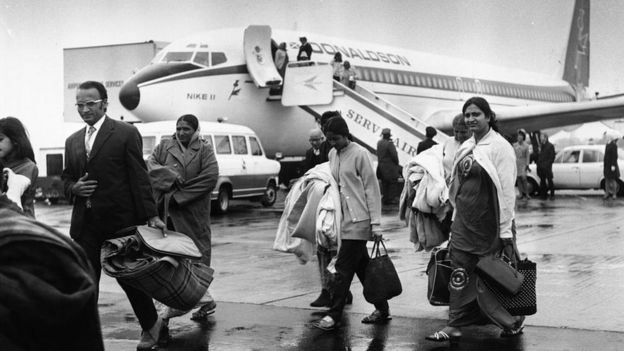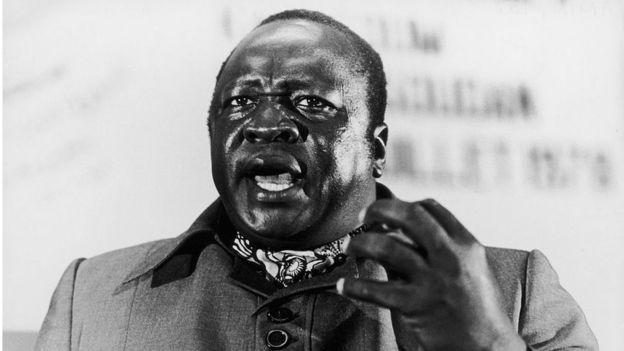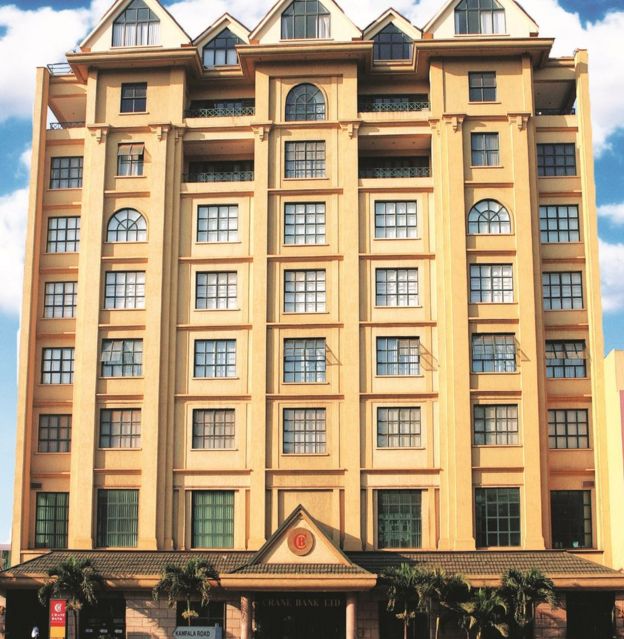- 15 May 2016
- From the sectionAfrica

Drop by an upmarket hotel, cafe or restaurant in Uganda's capital, Kampala, and the chances are the owner will be an Asian from the Indian subcontinent.
From running banks to farms to supermarkets to shopping malls, Ugandan Asians have regained their prominent role in the country's economy, following their mass expulsion more than four decades ago.
About 50,000 Asians were forced to leave the country in 1972, on the orders of former military ruler Idi Amin, who accused them of "milking Uganda's money".
At the time, they owned 90% of the country's businesses and accounted for 90% of Ugandan tax revenues.
Since their return to the country in the 1980s and 1990s, Asians from the Indian subcontinent have once again become a pillar of the country's economy.
 Image copyrightGETTY IMAGES
Image copyrightGETTY IMAGES After they were forced to leave Uganda, a large, prosperous community of Ugandan Asians found themselves scattered across the globe, many having left lost the businesses they had spent years working on.
In the years which followed, Uganda's economy slumped.
But when President Yoweri Museveni, who recently won a fifth term in office, seized power in 1986, he encouraged the exiles to return.
Now, despite making up less than 1% of the population, they are estimated to contribute up to 65% of Uganda's tax revenues.
One of those who came back is today the country's richest man, Sudhir Ruperalia, worth an estimated $800m.
He spent time in Britain in the 1970s, where he says he worked a series of menial jobs before saving enough money to return to Uganda.
"I started my business from scratch with $25,000 (£17,000) and since then we have built up into seven different sectors of the business. We employ more than 8,000 people in this country," he tells the BBC.

The Ruperelia Group is in banking, insurance, hospitality, real estate, education, broadcasting and floriculture.
On the whole Asian business ownership is more diverse than it was in the 1970s.
Ali Shah Jivraj, the 28 year-old founder and CEO of Royal Electronics, tells me that while his ancestors were in farming, his business is in consumer goods, manufacturing of electronics and real estate.
Ugandan-Asian tax revenue contributions
1972 - 90% of total receipts
1985 - 30%
2016 - 65%
Source: Indian Association of Uganda
He says Ugandan Africans are now involved in farm ownership and shop-keeping, which in the past had been almost solely Asian sectors.
Racial tensions, linked to the Ugandan Asians' economic dominance, do still exist, and have very occasionally spilled over into violence in the years since their return from exile.
But overall, the black communities I met were mainly positive about the employment created by Asian business people.
Among their main complaints were the special incentives offered to foreigners to do business in Ugandan, which they believe disadvantage locals.

There is also a real concern over labour exploitation, given that there is no official minimum wage in Uganda.
But as Chris Musiime, a local campaigner told me, many Ugandans are more worried about the Chinese, who are heavily involved in infrastructure projects. than South Asians.
"Some Ugandans complain that the Chinese bring in their own workforce rather than employ and train locals," he tells the BBC.
Others, who have worked for the Chinese in an unskilled capacity, speak of poor treatment and communication difficulties.
"They complain that some Chinese treat Africans much worse than the Indians ever did in the 1960s and 1970s."
So, have Ugandan Asians developed more compassion and respect for their fellow Africans, having been accused of marginalising and even mistreating them in the past?
 Image copyrightGETTY IMAGES
Image copyrightGETTY IMAGES The owner of Garden Earth Organic Farm, Nizar Sayani, seems to think so. He tells me he understands the problems of local people much better then he used to.
"I understand how they live and you need to do that so that so we can all go forward joining hands."
But there is still a need for more integration, according to Paul Lakuma from Uganda's Economic Policy Research Centre.
He says Uganda's Asian and African communities should not only cooperate through commerce, but could also benefit from more social integration and even marrying each other.
"This has happened in other countries in the West Indies, such as Jamaica, where Asians and the locals have intermarried, producing stronger and stable economic systems," he says.
"In this regard, cross-cultural marriage would minimize unnecessary tensions between the two groups."

Uganda's economy is expected to grow by up to 6% next year.
Asian business people I met said the country had suffered too much following their exile and that black Africans were now too involved in the economy to let it fail again.
They were not worried about history repeating itself.
But with youth unemployment at more than 60% and a huge disparity between the haves and the have-nots, everyone, including the Ugandan-Asian community, is keenly aware of the challenges that lie ahead.
